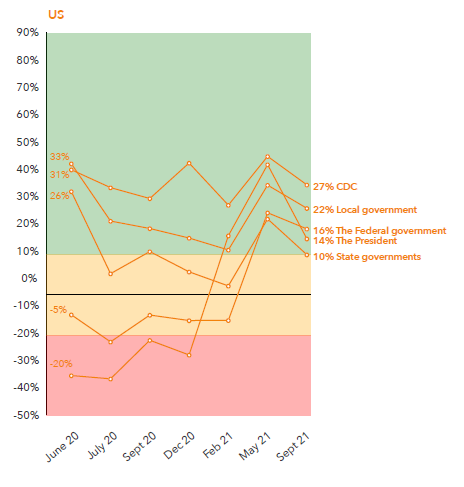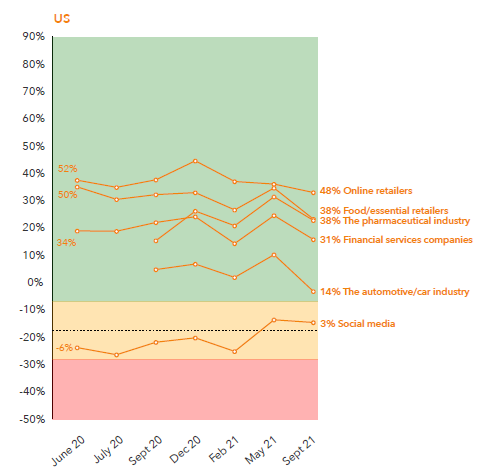Confidence in government decreasing and Americans predict next three years will bring increased taxes, living costs, an increased national debt and crime, according to latest Kekst CNC poll
As the COVID vaccine rollout continues, over 20% of US citizens refuse to take a vaccine as confidence in the government’s pandemic response falls and divisions between vaccinated and unvaccinated Americans continue to grow. Furthermore, Americans believe the country will be worse off on a series of indicators in three years. These insights are based on the newest edition of the global COVID-19 Opinion Tracker surveying a nationally representative sample of 1,000 American adults, conducted by leading strategic communications firm Kekst CNC.
Key findings:
- 58% of Americans said they would avoid low-vaccine parts of the country, 51% said they would avoid companies without a vaccine mandate, and one in ten said they have cut off unvaccinated friends;
- 61% of Democrats would cut off friends who are vaccinated, and nearly one in five (18%) already have; by contrast 32% of Republicans say they would and only 6% say they already have;
- Americans are now are the least likely to take the vaccine out of countries surveyed while simultaneously being more concerned about the impact of the coronavirus than other countries surveyed;
- Of those already vaccinated, 83% of Americans surveyed said they would get a booster shot;
- 41% of Americans said that a vaccine mandate from their employer would make them more likely to look for another job, while only 33% said it would make them less likely to seek out a different employer;
- Consistent with last year, almost six in ten Americans surveyed said they expected another severe wave of coronavirus this winter;
- Confidence in the CDC, President Biden, and every level of government has decreased since May, with confidence in the President falling from the highest rated institution to the second lowest.
In regards to the findings, Piotr Pillardy, Deputy Head of Knowledge, Intelligence, Research, and Analysis at Kekst CNC said, “Our research indicates a clear division between those who are willing to get vaccinated and those who are not. Given how politicized the vaccine has become, it is ever more important for businesses to navigate the issue in an informed way. Since our last poll in April, the percentage of respondents willing to take a COVID-19 vaccine has nearly remained flat, only increasing by 3% to 79%. This leaves the US at least 5 percentage points behind the other markets surveyed.”
Approximately 41% of respondents in the US said they would be more likely to look for another job if their employer mandated their vaccination. Other Americans, however, find vaccinations essential to a return to office plan, with 55% of respondents indicating they would work from home to avoid unvaccinated colleagues.
Pillardy continued, “While avoiding interactions with unvaccinated people is a priority for some Americans, there is still a general interest in avoiding any national lockdown measures. While 53% of Americans endorse a mandatory mask mandate indoors if hospitals are struggling, less than one in four of respondents support the closing of nightclubs (26%), non-essential shops (20%) and restaurants (24%) under any scenario.”
“Despite initial optimism for President Biden, the CDC, and all levels of government in May, the percentage of respondents indicating that the President, CDC, and all levels of government were responding to the coronavirus well declined, with President Biden falling to his lowest position yet (14% net “well”). That said, Americans expressed positive sentiments towards how CEOs of major companies have responded to the pandemic, addressed the welfare of their employees, and racial inequality,” Pillardy concluded.
Americans also indicated concern for the future, expecting the cost of living, taxes, national debt and crime to all rise substantially in the next three years. Respondents also reported that they believe the quality of their political leadership will decline and the standing of the United States on the world stage will not increase as much as they hope.

The approval of all major industries’ response to the pandemic declined since May, with the largest declines in the food/essential retailers and automotive/car industries. Online retailers remained the highest scored. The social media industry achieved a net positive approval rating for the second time since the tracking survey began.

Comparing the US to the other countries surveyed:
- Nearly three-quarters (73%) of Americans believed the impact on businesses and how they function would last longer than a year, coming last behind Japan (90%), the UK (85%), France (80%), and Sweden (77%).
- Only 31% of US respondents indicated they believed the national economic situation would be weaker in three months, falling in the middle of countries surveyed. Japan (43%) led the negative three-month outlook, followed by the UK (tied with US at 31%), France (28%), Germany (23%), and Sweden (18%).
- American respondents were the most concerned about the health of people in the country as a whole (57%), an increase from 52% in May. 46% of the respondents in the U.K. were also worried about the health of people in their country as a whole, a decline from 53% in May. Less than half of respondents in Germany (39%), France (35%), Sweden (33%), and Japan (28%) expressed a high level of concern for the health of people in their country as a whole.
- US respondents remained the most likely to say they feared for their own health (53%), followed by those in the UK (42%), France (41%), Germany (38%), Sweden (29%) and Japan (28%). The US and the UK were the only countries that saw an increase in concern for personal health from May.
Methodology and Full Results
- Nationally representative sample of 1,000 adults in Great Britain, 1,000 adults in Sweden, 1,000 adults in Germany, 1,000 adults in United States, 1,000 adults in Japan and 1,000 adults in France.
- Fieldwork took place on 28th September – 5th October 2021
- Quotas and weights on gender, age, and region in each country.
- Margins of error of +/- 3.3% for all countries.
- Full results of the global survey available here.
About Kekst CNC
Kekst CNC is a global strategic communications firm that specializes in protecting and enhancing reputations. From 14 locations around the globe, our team of 250 professionals provides expert communications counsel, informed by judgment, insights and data-led analysis. We apply our communications expertise across high-stakes corporate, financial, and political matters, helping businesses communicate effectively through periods of disruption, transformation and growth. Kekst CNC is part of the Publicis Groupe.
Further information is available at www.kekst.com.
Media Contacts:
For the US
Jeffrey Taufield
212-521-4815
[email protected]
For the UK, France, Germany, and Sweden
James Johnson
+447826714286
[email protected]
For Japan
Jochen Legewie
+819027547776
[email protected]

